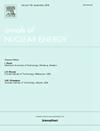IF 1.9
3区 工程技术
Q1 NUCLEAR SCIENCE & TECHNOLOGY
引用次数: 0
摘要
先进的反应堆设计需要高精度、高效率的中子建模能力,以满足实际设计需要。许多输运代码都是为高保真针脚分辨计算而设计的,计算成本往往很高,而基于扩散理论或 SPN 方法的低阶求解器则无法准确模拟输运效应,其求解结果在具有显著局部异质性的区域往往容易出现振荡。在本文中,我们尝试基于新开发的节点离散序数分析(ANDO)方法(Rocheleau 和 Wang,2020 年,2022 年)开发一种可行的针状全核输运求解器,以解决这些建模难题。在此,我们将固定源问题的 ANDO 解决方案扩展到 k 特征值问题,并采用幂次迭代算法进行求解。在我们的 ANDO 方法实施过程中,所有裂变或部分裂变与散射源相结合,并在每次幂迭代过程中进行分析积分。这种新颖的处理方法可以大大提高 ANDO 方法在 k 特征值中子输运计算中的计算精度和效率。本文章由计算机程序翻译,如有差异,请以英文原文为准。
A nodal analytical discrete ordinates solver for pin-homogenized core calculation
Advanced reactor designs require highly accurate and efficient neutronics modeling capabilities for practical design needs. Many transport codes are designed for high-fidelity pin-resolved calculations, which are often computationally expensive, while low order solvers such as those based on diffusion theory or SPN methods cannot accurately model transport effects and their solution is often prone to oscillations in regions with significant local heterogeneities. In this paper, we try to address such modeling challenges by developing a viable pin-wise whole-core transport solver based on a newly developed nodal analytical discrete ordinates (ANDO) method (Rocheleau and Wang, 2020, 2022). Here we extend the ANDO solution for fixed-source problems to k-eigenvalue problems, which are solved with the power iteration algorithm. In our implementation of the ANDO method, all the fission or part of it is combined with the scattering source and integrated analytically during each power iteration. Such a novel treatment can greatly improve computational accuracy and efficiency of the ANDO method for k-eigenvalue neutron transport calculations.
求助全文
通过发布文献求助,成功后即可免费获取论文全文。
去求助
来源期刊

Annals of Nuclear Energy
工程技术-核科学技术
CiteScore
4.30
自引率
21.10%
发文量
632
审稿时长
7.3 months
期刊介绍:
Annals of Nuclear Energy provides an international medium for the communication of original research, ideas and developments in all areas of the field of nuclear energy science and technology. Its scope embraces nuclear fuel reserves, fuel cycles and cost, materials, processing, system and component technology (fission only), design and optimization, direct conversion of nuclear energy sources, environmental control, reactor physics, heat transfer and fluid dynamics, structural analysis, fuel management, future developments, nuclear fuel and safety, nuclear aerosol, neutron physics, computer technology (both software and hardware), risk assessment, radioactive waste disposal and reactor thermal hydraulics. Papers submitted to Annals need to demonstrate a clear link to nuclear power generation/nuclear engineering. Papers which deal with pure nuclear physics, pure health physics, imaging, or attenuation and shielding properties of concretes and various geological materials are not within the scope of the journal. Also, papers that deal with policy or economics are not within the scope of the journal.
 求助内容:
求助内容: 应助结果提醒方式:
应助结果提醒方式:


